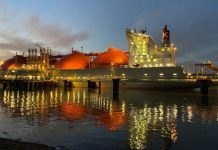 Following the government’s announcement last year that it was committing to net zero emissions by 2050, the move away from natural gas and towards electricity, heat pumps and hydrogen has become inexorable, according to Gavin McCormick of energy software consultancy Beond, who was speaking at The Energyst’s “Gas: What’s in the pipeline” webinar.
Following the government’s announcement last year that it was committing to net zero emissions by 2050, the move away from natural gas and towards electricity, heat pumps and hydrogen has become inexorable, according to Gavin McCormick of energy software consultancy Beond, who was speaking at The Energyst’s “Gas: What’s in the pipeline” webinar.
The UK’s key challenges to 2050 are to increase the percentage of hydrogen, develop biomethane, boost low-carbon heating and electrify the heat load.
McCormick sees 2030 as a pivotal turning point for the gas sector. Currently only 0.1% of hydrogen can be inserted into the gas grid. This could rise to as much as 20% fairly quickly, but after that there are technical difficulties.
While policies are being introduced to eliminate gas from new-build properties from 2025, retrofitting older properties with heat pumps will be a huge challenge. And electricity alone cannot replace all gas in terms of heat load. “So, there’s lots to do up to 2030 and beyond,” McCormick says.
He expects both biomethane and hydrogen to need significant investment if they are to rise to the challenge. A green gas levy to support biomethane is due for introduction in late 2021, although the Covid emergency may affect the timing. “The green gas levy consultation has just started: it’s hard to tell what it will look like by 2050,” he says, “but it’s a significant funding and investment challenge,” he says.
Against a background of traditionally low and stable non-energy costs for gas, “we’re now moving towards a more volatile and unpredictable non-energy cost for gas,” he predicts. He also sees a return to the town gas model of the 1950s, away from the UK-wide network that has dominated since the 1970s.
According to McCormick, the future for the electric vehicles (EV) sector will be limited by resource constraints associated with battery production. For this reason, he believes hydrogen will play a much greater role through the next decade: “The 2030s will see the start of the hydrogen revolution.”




By 2050 it is unlikely that 100% hydrogen will be used for building heating; although hydrogen ready boilers have been developed, and can run the present gas and 100% hydrogen, when switched to 100% hydrogen they need a technician to change each boiler over. As the change cannot be done for all the boilers at the same time, it is not a practical solution unless the hydrogen ready boiler can run on both types of gas without intervention. If gas continues to be used for building heating, biomethane from organic waste digesters could be used but it is unlikely that there will be enough to meet the demand by 2050. The 2050 solution to net zero carbon emissions of heating is more likely to be with heat pumps and the most efficient are ground source that need to be installed in all new buildings from now on; air source heat pumps are the easiest to retrofit an existing building.